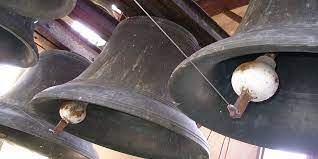Sunday – New Year’s Day
I’ve shared Tennyson’s “Ring Out Wild Bells” in previous New Year posts—it’s the archetypal poem for the occasion—but I thought that for today’s essay I’d provide some of the poetic context. Tennyson had to struggle to accept the hopefulness represented by the bells.
The verses appear in In Memoriam, Tennyson’s elegy to his bosom buddy Arthur Hallam. The poet spent 17 years writing it and it is one of the great poems in the English language. Like many people, Tennyson is particularly affected by the death at Christmas time.
The poet describes three Christmases in the course of the poem, and one can track the progress of his grief through his changing attitudes. Not surprisingly, the first Christmas is the hardest. Tennyson reports,
This year I slept and woke with pain,
I almost wish’d no more to wake,
And that my hold on life would break
Before I heard those bells again…
The Christmas bells confuse him because they mingle remembered joy with his current sorrow. He is almost sarcastic when he speaks of “the merry merry bells of Yule”:
But they my troubled spirit rule,
For they controll’d me when a boy;
They bring me sorrow touch’d with joy,
The merry merry bells of Yule.
As the family turns to the Christmas celebration, it finds that Hallam’s death weighs heavy:
At our old pastimes in the hall
We gambol’d, making vain pretence
Of gladness, with an awful sense
Of one mute Shadow watching all.
Tennyson writes “Ring Out Wild Bells” in response to the third Christmas, when the Tennysons find themselves in a new locale. The church bells therefore sound different:
A single peal of bells below,
That wakens at this hour of rest
A single murmur in the breast,
That these are not the bells I know.Like strangers’ voices here they sound,
In lands where not a memory strays,
Nor landmark breathes of other days,
But all is new unhallow’d ground.
The change in locale is not the only difference, however, Tennyson resolves that, for this Christmas, neither his grief nor life’s petty cares will dampen the celebration:
No more shall wayward grief abuse
The genial hour with mask and mime;
For change of place, like growth of time,
Has broke the bond of dying use.Let cares that petty shadows cast,
By which our lives are chiefly proved,
A little spare the night I loved,
And hold it solemn to the past.
Because of this change, Tennyson can now fully embrace the bells. He is prepared to “ring out the old, ring in the new.” Significantly, ringing out the old includes ringing out “the grief that saps the mind,/For those that here we see no more.”
In other words, he is willing to look forward again and embrace optimism. The verses represent as affirmative a poetic declaration as to be found anywhere (although sometimes Percy Shelley gets close). This is why I regard “Ring Out Wild Bells” as the archetypal New Year’s poem.
So allow yourself to hope and dream again as you read these lines:
Ring out, wild bells, to the wild sky,
The flying cloud, the frosty light:
The year is dying in the night;
Ring out, wild bells, and let him die.Ring out the old, ring in the new,
Ring, happy bells, across the snow:
The year is going, let him go;
Ring out the false, ring in the true.Ring out the grief that saps the mind
For those that here we see no more;
Ring out the feud of rich and poor,
Ring in redress to all mankind.Ring out a slowly dying cause,
And ancient forms of party strife;
Ring in the nobler modes of life,
With sweeter manners, purer laws.Ring out the want, the care, the sin,
The faithless coldness of the times;
Ring out, ring out my mournful rhymes
But ring the fuller minstrel in.Ring out false pride in place and blood,
The civic slander and the spite;
Ring in the love of truth and right,
Ring in the common love of good.Ring out old shapes of foul disease;
Ring out the narrowing lust of gold;
Ring out the thousand wars of old,
Ring in the thousand years of peace.Ring in the valiant man and free,
The larger heart, the kindlier hand;
Ring out the darkness of the land,
Ring in the Christ that is to be.
